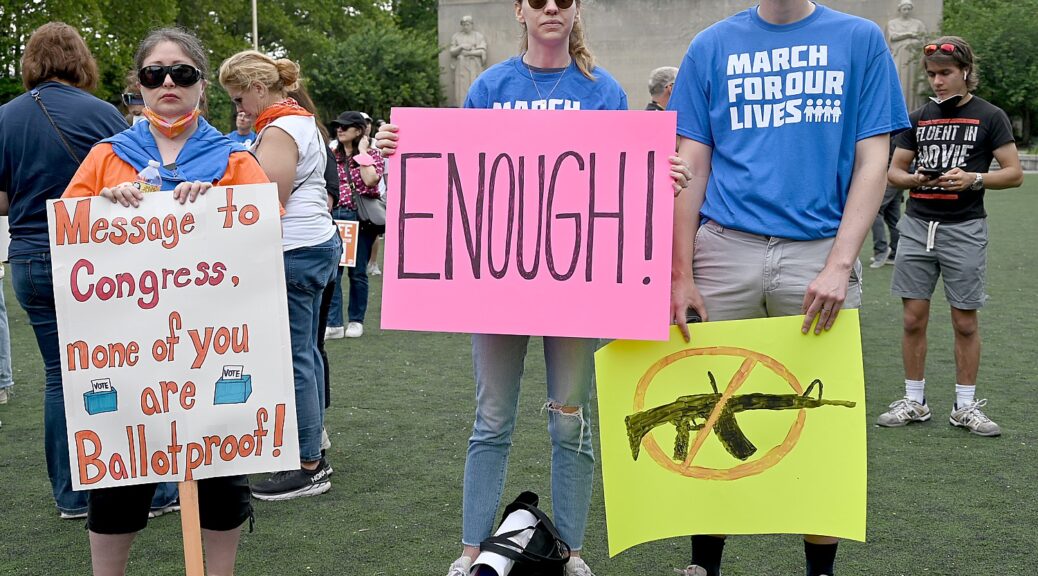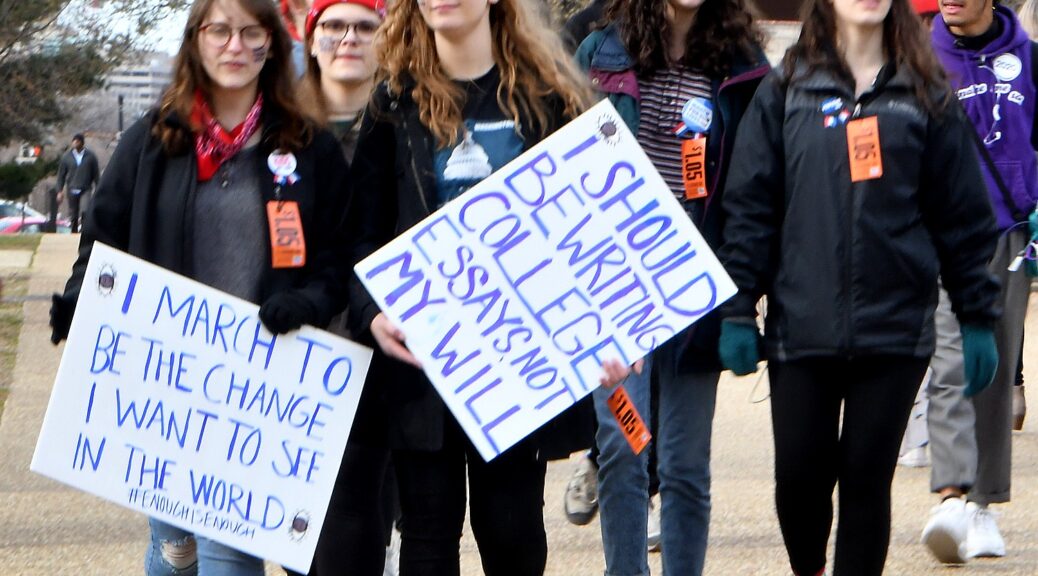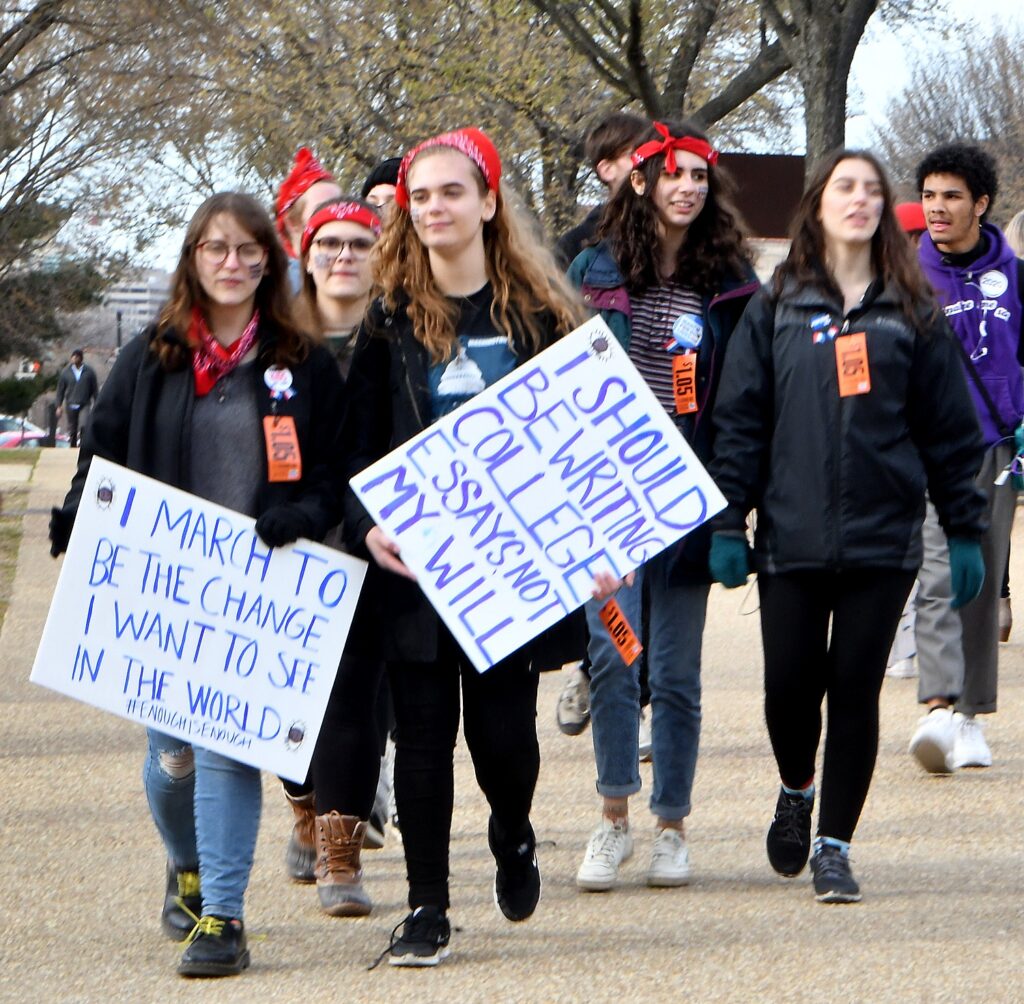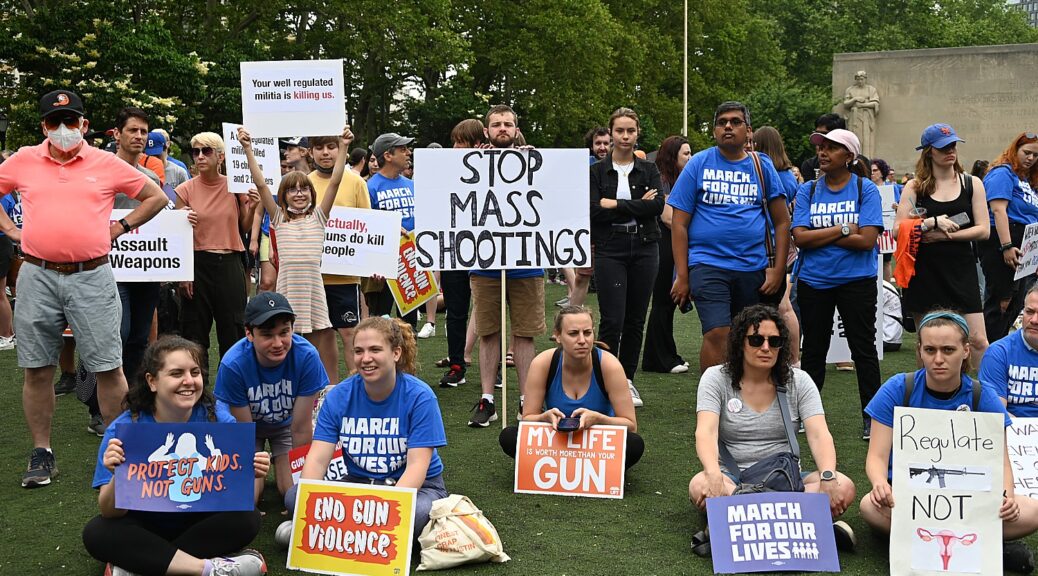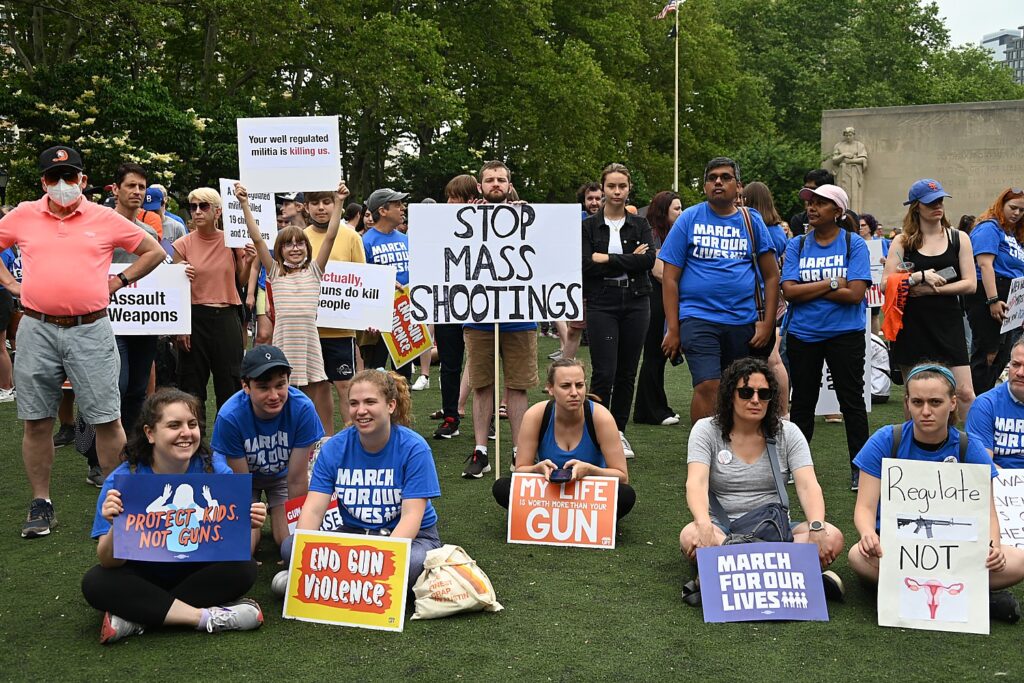New Department of Justice final rule sets strong standard for gun sellers who have to get a license and conduct background checks. But President Biden called on Congress to enact universal background checks and finish the job. This fact sheet is provided by the White House:

The Biden-Harris Administration announced a new rule that will save lives by reducing the number of firearms sold without background checks. This final rule implements the Bipartisan Safer Communities Act’s expansion of firearm background checks—the only significant expansion of the background check requirement since then-Senator Biden helped shepherd the Brady Bill over the finish line in 1993. This action is part of the Biden-Harris Administration’s strategy to stem the flow of illegally acquired firearms into our communities and hold accountable those who supply the firearms used in crime.
“I’ve spent hours with families who’ve lost loved ones to gun violence,” President Joe Biden stated. “They all have the same message: ‘Do something.’ Today, my Administration is taking action to make sure fewer guns are sold without background checks. This is going to keep guns out of the hands of domestic abusers and felons. And my Administration is going to continue to do everything we possibly can to save lives. Congress needs to finish the job and pass universal background checks legislation now.”
“Every year, thousands of unlicensed gun dealers sell tens of thousands of guns without a background check, including to buyers who would have failed one – domestic abusers, violent felons, and even children,” stated Vice President Kamala Harris. “This single gap in our federal background check system has caused unimaginable pain and suffering. Today, as the head of the White House Office of Gun Violence Prevention, I am proud to say that all gun dealers must conduct background checks no matter where or how they sell.”
The federal gun background check system is one of the best tools we have to keep guns out of the hands of individuals prohibited from purchasing or possessing firearms, including domestic abusers and other violent criminals. But the loopholes in America’s background check laws have enabled domestic abusers, school shooters, violent criminals, and gun traffickers to illegally acquire firearms. Over the past 20 years, there have been numerous failed efforts to close these loopholes and expand background checks, including a bipartisan attempt in 1999 that followed the shooting at Columbine High School, and another bipartisan attempt in 2013 that followed the shooting at Sandy Hook Elementary School.
In 2022, President Biden accomplished what many had tried for the past 20 years—he succeeded in expanding background checks by signing into law the Bipartisan Safer Communities Act. This law broadened the category of gun sellers required to become licensed dealers and run background checks. In 2023, President Biden signed an Executive Order to accelerate implementation of the Bipartisan Safer Communities Act, including by directing the Attorney General to move the U.S. as close to universal background checks as possible without additional legislation by clarifying the new Act. The Department of Justice’s (DOJ) final rule clarifies the type of conduct that requires a person to get a license to sell guns and to conduct background checks. By setting clear standards for when someone is dealing firearms, the rule provides the Bureau of Alcohol, Tobacco, Firearms and Explosives (ATF) with proactive tools to enforce the law and keep our communities safe.
Background Check Loopholes Have Deadly Consequences
Since 1994, federal law has required federally licensed firearms dealers to run background checks prior to selling or transferring a weapon. These background checks have helped keep guns out of the hands of more than three million individuals who are prohibited from purchasing or possessing firearms. Despite the law, a growing number of unlicensed sellers continue to sell firearms for profit to complete strangers they meet at gun shows and online marketplaces, which has been a critical gap in the background check laws.
For the past 30 years, individuals who could not pass a background check sought out unlicensed sellers in order to evade the background check system. One investigation found that 1 in 9 people who respond to online ads from unlicensed sellers would fail a background check. Tragic consequences of this unlawful conduct include:
- In 1999, the school shooters from the Columbine High School shooting were both under 18 and too young to purchase firearms legally. The shooters had their acquaintance purchase firearms for them at a gun show through an unlicensed seller to avoid a background check.
- In 2012, a domestic abuser was barred from possessing firearms following a restraining order taken out by his estranged wife. The day before the abuser killed his wife and two others, and injuring four at the Azana Salon in Wisconsin, he purchased a gun from an unlicensed seller he met online without a background check.
- In 2019, a man shot and killed seven people and wounded dozens more after a multiple-location shooting in Midland and Odessa, Texas. The shooter had previously tried to purchase a gun from a sporting goods store but was stopped by a background check because of his mental health history. He was ultimately able to purchase an AR-15 assault-style rifle without a background check from an unlicensed seller he met online.
Unlicensed dealers who do not conduct background checks are also the largest source of firearms that are illegally trafficked into our communities. In an assessment of its gun trafficking investigations from 2017 to 2021, ATF identified sales by unlicensed dealers as the most frequently used gun trafficking channel. Moreover, unlicensed dealers were the source of more than half of the firearms identified as having been trafficked during the five-year study period—a total of more than 68,000 illegally trafficked firearms.
Final Rule Implements New Law, Expanding Background Check Requirement to Tens of Thousands of Gun Sales
The Department of Justice’s final rule implements the Bipartisan Safer Communities Act—the largest expansion of background checks since the Brady Bill became law.
The final rule makes clear when a person needs to become a licensed dealer and run background checks, and gives the Department of Justice additional tools to crack down on individuals illegally selling guns without background checks. Specifically, the final rule:
- Lists the types of commercial activity indicating that a person must become a licensed dealer and run background checks, absent evidence showing they are in fact not engaged in the business of firearms dealing. For example, if a person is repetitively selling guns of the same or similar make and model within one year of their purchase, they are supposed to become a licensed dealer. If a person repetitively sells firearms within thirty days of purchasing those firearms, or selling firearms and tells potential buyers that they can acquire additional firearms for that buyer to purchase, the seller is supposed to become a licensed dealer.
- States that the gun show or online sale loopholes do not exist. If you are conducting business that in a brick-and-mortar store would require you to become a licensed dealer, you have to become a licensed dealer and run background checks. It does not matter whether you are dealing firearms at a gun show, online, in your home, in the trunk of a car, at a flea market, or anywhere else—you must obtain a license and run background checks results. Evidence that a person placed ads online or reserved a table at a gun show shows that the person is intending to profit from the sale.
- Prevents people from evading the licensing and background check requirements by claiming that they are just selling a few guns. The final rule clarifies that even a single firearm transaction may be sufficient to require a license, if there is other behavior to suggest commercial activity. For example, a person selling just one gun and then saying to others they are willing and able to purchase more firearms for resale may be required to obtain a license and run background checks.
- Prevents people from falsely claiming that guns are part of a personal collection in an attempt to evade the law. The statute explicitly states that making occasional sales of a firearm from a personal collection or liquidating collection does not require a federal firearms license or background checks. However, people have evaded the background check requirement by falsely claiming they are selling their personal collection. The final rule makes clear that a personal collection of firearms is limited to collections acquired for specific reasons like study; comparison; exhibition; or for a hobby, like hunting or sport shooting. A bona fide personal collection is not the same as business inventory.
- Closes the so-called firesale loophole. Gun dealers who have had their licenses revoked have sometimes then sold their former business inventory without running background checks. The final rule makes clear that a business inventory may not be transferred to a person’s personal collection after a license is revoked. Instead, a business could dispose of this inventory through another licensed seller who runs background checks.
There are over 80,000 licensed gun dealers in America. The Department of Justice estimates that there are over 20,000 unlicensed sellers who are selling firearms through online advertisements, gun shows, and other means. These unlicensed sellers should be licensed under the Bipartisan Safer Communities Act and the new rule, and therefore conducting background checks. An alternative estimate based on survey data estimates that the new rule could affect gun sales being made by over 80,000 individuals. Legal limitations on tracking firearms make such estimates difficult to quantify.
Final Rule Builds on the Biden-Harris Administration’s Commitment to Stopping the Illegal Flow of Guns
The Biden-Harris Administration has deployed a historic effort to partner with state and local law enforcement and keep communities safe by addressing the illegal sources of guns. The strategy is focused not just on the person who pulled the trigger of a firearm, but also on all of the links in the chain that led to the firearm being in the wrong hands, including the gun trafficker, the source of the gun trafficker’s firearms, rogue gun dealers who are willfully violating the law, and ghost gun manufacturers. Key Administration actions to stop the illegal flow of guns into our communities include:
- Gun Trafficking Law Enforcement: In 2021, the Justice Department launched five new law enforcement strike forces focused on addressing significant firearms trafficking corridors that have diverted guns to New York, Chicago, Los Angeles, the Bay Area, and Washington, D.C. The Bipartisan Safer Communities Act also enacted the first ever federal gun trafficking law and federal straw purchasing law. The new gun trafficking law has been used to charge more than 300 people and led to the seizure of over 1,500 firearms.
- Cracking Down on Rogue Gun Dealers: The Justice Department enacted a new policy to maximize the efficacy of ATF resources to crack down on rogue gun dealers violating our laws and underscored zero tolerance for willful violations of the law by federally licensed firearms dealers that put public safety at risk. The new ATF inspection policies have led to 245 license revocations over the past two years, which is the highest two-year total in nearly twenty years.
- Stopping Gun Manufacturers Illegally Selling Ghost Guns: The Justice Department issued a final rule to rein in the proliferation of ghost guns, which are unserialized, privately made firearms that are increasingly being recovered at crime scenes. According to ATF, the recovery of ghost guns by law enforcement increased 1,083 percent between 2017 and 2021. The Biden-Harris Administration cracked down on ghost guns by making clear that businesses manufacturing the most accessible ghost guns, including “buy-build-shoot” kits and certain polymer handgun frames (including certain Polymer80 handgun frames) must comply with federal firearm laws requiring background checks, a federal license, and markings, such as serial numbers.
- Senate Confirmed ATF Director: President Biden secured the confirmation of ATF Director Steve Dettelbach, the first permanent ATF Director in over seven years to lead the agency tasked with enforcing our nation’s gun laws.
- Crime Gun Intelligence Centers: ATF works with state and local law enforcement to establish crime gun intelligence centers, which uses the National Integrated Ballistics Information Network (NIBIN) and crime gun tracing to provide investigative leads to solve shootings and identify gun trafficking channels.
- New Analysis on Gun Trafficking: In 2021, President Biden announced that the ATF would publish the first gun trafficking analysis in twenty years. ATF has published three volumes, with the most recent volume showing that the most frequent type of trafficking channel identified in ATF gun trafficking investigations was unlicensed firearms dealing by private persons at 40.7 percent. These investigations accounted for over half of the firearms identified as trafficked in ATF investigations. The second most frequent trafficking channel was straw purchasers.
Call for Congress to Act
While the Biden-Harris Administration is moving as close as possible to universal background checks without additional legislation, President Biden and Vice President Harris continue to call on Congress to enact universal background checks and finish the job.
The President and Vice President also continue to call on Congress to increase funding for the ATF so the agency can continue its life-saving work to stop the flow of illegal firearms into our communities. The President requested $2 billion for ATF as part of his FY 25 budget request.

